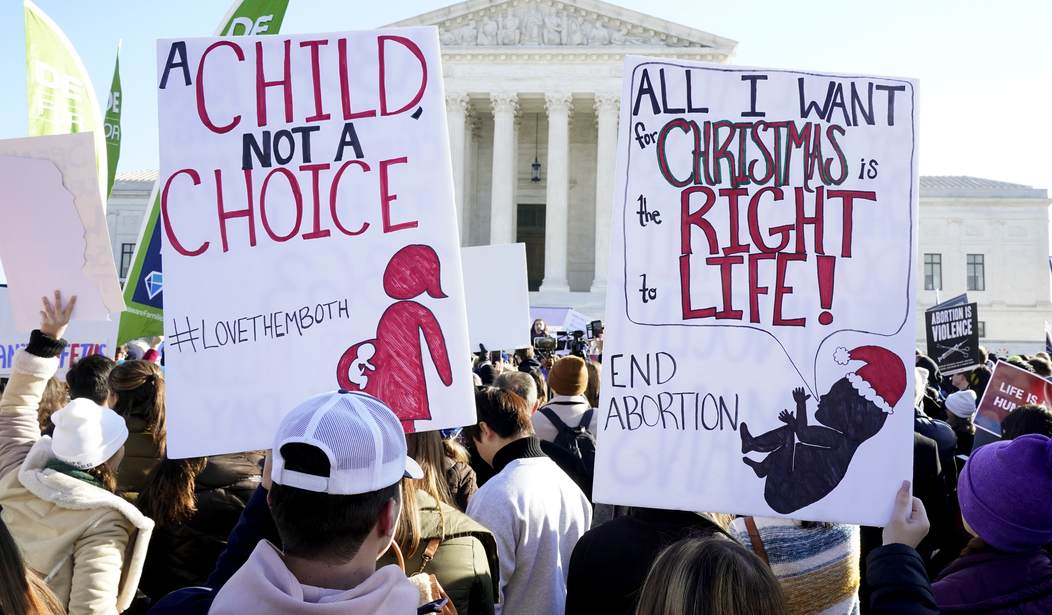On Friday, the Texas Supreme Court ruled against abortion providers bringing suit against the Texas Heartbeat Act, also known as SB8. The decision was not only unanimous, but it's almost certainly the end of the line for the abortion providers. The law makes almost all abortions in Texas illegal once a fetal heartbeat is detected, which is usually at about six weeks.
Reporting from the Associated Press, which was particularly hysterical, noted in explaining the case that:
The decision by the Texas Supreme Court, which is entirely controlled by Republicans, spelled the coming end to a federal lawsuit that abortion clinics filed even before the restrictions took effect in September, but were then rejected at nearly every turn afterward.
“There is nothing left, this case is effectively over with respect to our challenge to the abortion ban,” said Marc Hearron, attorney for the Center for Reproductive Rights, which led the challenge against the Texas law known as Senate Bill 8.
Although Texas abortion clinics are not dropping the lawsuit, they now expect it will be dismissed in the coming weeks or months.
...
The decision by the Texas Supreme Court turned on whether medical licensing officials had an enforcement role under the law known as Senate Bill 8, and therefore, could be sued by clinics that are reaching for any possible way to halt the restrictions.
But writing for the court, Justice Jeffrey Boyd said those state officials have no enforcement authority, “either directly or indirectly.”
Texas abortion providers had already acknowledged they were running out of options and that the law would stay in place for the foreseeable future.
Recommended
The Center for Reproductive Rights also responded in a lengthy Twitter thread, with one tweet complaining that women now have to choose life for their children. "Many other Texans have been unable to travel out of state and have been forced to carry their pregnancies to term," a tweet read in part.
“We are in a moment of crisis not only for reproductive rights but for our justice system and the rule of law. With this ruling, the sliver of this case that we were left with is gone…" — Nancy Northup, Center President and CEO
— Center for Reproductive Rights (@ReproRights) March 11, 2022
Scores of Texans have been denied abortion care in the state since #SCOTUS let the law take effect roughly 6 months ago. #BansOffOurBodies
— Center for Reproductive Rights (@ReproRights) March 11, 2022
Many other Texans have been unable to travel out of state and have been forced to carry their pregnancies to term or attempt to manage an abortion on their own. #AbortionIsEssential
— Center for Reproductive Rights (@ReproRights) March 11, 2022
Learn more about today's ruling and the timeline of our case here:https://t.co/gKeChaSFMY
Meanwhile, pro-life advocates are celebrating the decision.
"This is a big win for children in Texas. The Supreme Court of Texas has ruled against the abortion industry in their litigation against the Texas Heart Beat Law. The law will continue to protect children with a detectable heartbeat from the violence of abortion," said Lila Rose, president of Live Action.
This Texas law is unique in that enforcement lies with private citizens who can bring suit against an abortion provider when it comes to illegal abortions or someone who seeks to aid in getting an illegal abortion.
In an opinion piece published last September in the Wall Street Journal, around the time the law went into effect, the bill's author, state Sen. Bryan Hughes, explained how "The Texas Abortion Law Is Unconventional Because It Had to Be."
At one point he wrote:
Yet prosecutors from across the country—including district attorneys from Dallas, Bexar, Nueces and Fort Bend counties in Texas—have announced their refusal to enforce laws regulating abortion, even before they become law and before they’re litigated. Even if Roe is overturned, they say, they won’t enforce democratically passed abortion laws. If officials sworn to enforce state laws pre-emptively decide they won’t do it, even when the laws are passed and ratified and have not been challenged in the courts, state legislators are obliged to get creative.
The U.S. Supreme Court had also allowed the law to remain in effect during legal proceedings. The Court also heard oral arguments last December for Dobbs v. Jackson, which will decide the constitutionality of previability abortion bans, specifically when it comes to Mississippi's Gestational Age Act from 2018, which bans most abortions past 15-weeks. The decision, which could overturn or at least weaken Roe v. Wade, is expected in June.
As Madeline has covered, other states have become emboldened to pass more pro-life laws, especially similar 15-week abortion bans.

























Join the conversation as a VIP Member